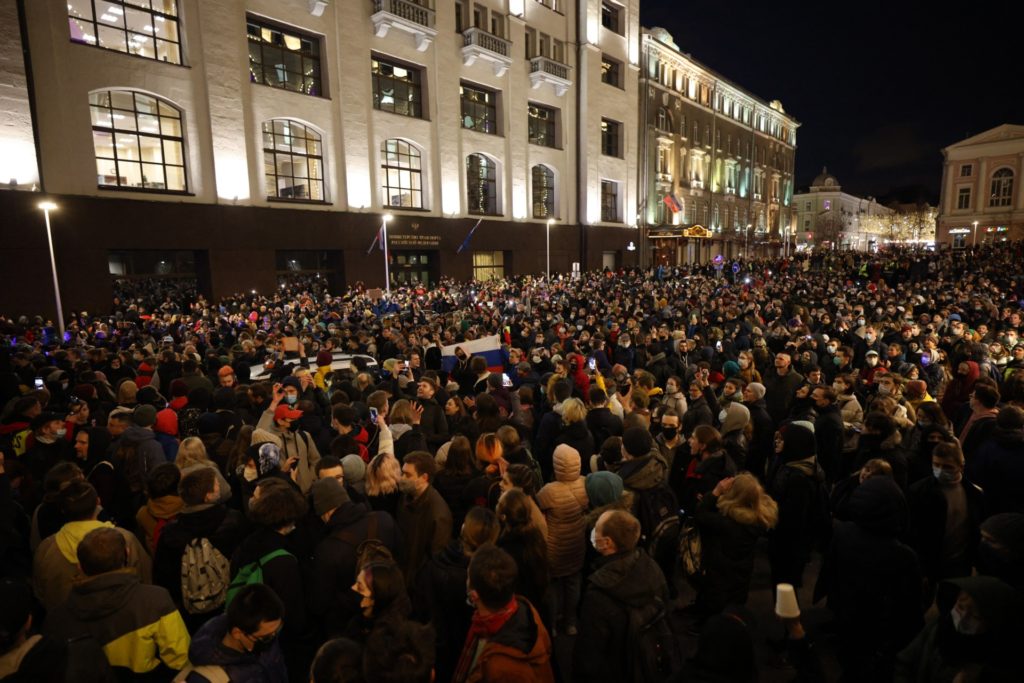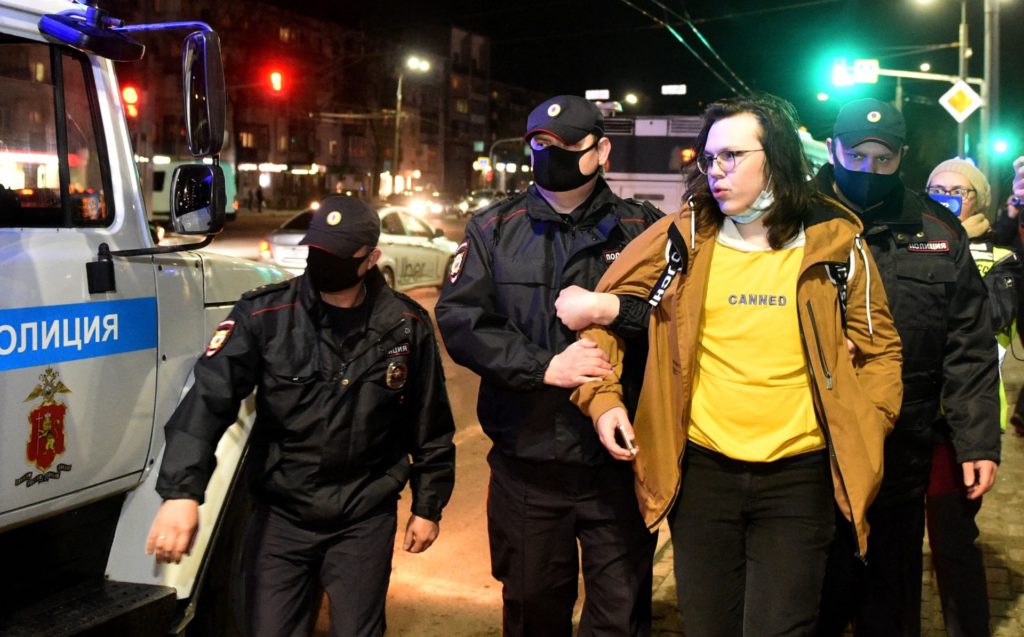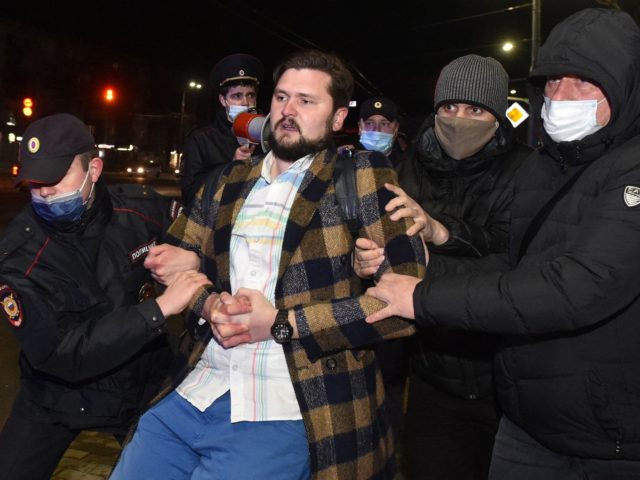Russian authorities detained over 1,700 protesters across the country on Wednesday as they demonstrated in support of imprisoned Russian dissident Alexei Navalny, according to OVD-Info, an organization tracking police detentions.
The exact figure of 1,782 arrests includes 804 protesters in St. Petersburg and 119 in Ufa, the organization asserted.
The nationwide protests and subsequent mass arrests coincided with Russian leader Vladimir Putin’s speech to the federal legislature in which he made a series of nationalist pronouncements, warning Western nations not to cross Russia’s “red lines” and implicitly asserting that Belarus and Ukraine lay decisively within Russia’s zone of exclusive influence. He did not define what any of those “red lines” are.
“This is one of the last gasps of a free Russia, as many are saying. We came out for Alexei … against a war in Ukraine and the wild propaganda,” Marina, a student at the Moscow protest, said to Reuters. The Russian military has staged a large-scale buildup on the Ukrainian border, prompting international concerns of an impending escalation of the ongoing war in Donbass.

Opposition supporters attend a rally in support of jailed Kremlin critic Alexei Navalny, in Moscow on April 21, 2021. Jailed Kremlin critic Alexei Navalny’s team called for demonstrations in more than 100 cities, after the opposition figure’s doctors said his health was failing following three weeks on hunger strike. (DIMITAR DILKOFF/AFP via Getty Images)
In his speech, Putin did not mention Navalny, who is currently in a penal hospital suffering reportedly severe health complications. The latter has been on a hunger strike since early April to protest his alleged lack of health care. Navalny has used his Instagram account to update supporters on his condition. His doctors have repeatedly attempted to access Navalny to examine him, to no avail. Yaroslav Ashikhmin, one of Navalny’s doctors, on Monday said he could “die at any moment.”
The dissident entered a penal colony after a court found he violated his probation pertaining to earlier embezzlement charges. His supposed violation involved his absence from Russia while recuperating in a German hospital from an alleged assassination attempt. Navalny has accused Putin of ordering his death, which the Kremlin has adamantly denied. In September 2020, German doctors announced they had found “unequivocal proof” that Navalny had been exposed to Novichok, a chemical nerve agent notorious for its use in Russian political hits. There are no known instances of assassination using Novichok not associated with the Russian government.
Russia’s Interior Ministry estimated that roughly 6,000 protesters demonstrated in Moscow on Wednesday and another 4,500 in St. Petersburg. Navalny’s supporters have asserted the turnout was up to ten times the government estimates, though Alexey Venediktov of Ekho Moskvy radio station gave a more measured, but still greater, estimate of 10,000-15,000 people in Moscow and 7,000-9,000 in St Petersburg.
Protests over Navalny’s arrest and sentencing have been ongoing since February. Russia arrested roughly 1,400 demonstrators on February 2 in the immediate aftermath of Navalny’s detention. Wednesday’s figures mark one of, if not the, largest single day of mass arrests in the country since the demonstrations began.
Apart from the mass arrests, the government has made considerable efforts to curtail the pro-Navalny demonstrations. State media censor Roskomnadzor began pressuring social media giants, especially the Chinese company TikTok, to remove pro-Navalny content, ostensibly under the guise of coronavirus restrictions on mass gatherings. It is a crime in Russia to incite minors to attend illegal gatherings. After their refusal, the state censor announced in March that it would pursue legal cases against multiple platforms, including TikTok, Google, Facebook, and Twitter, for their non-compliance in removing pro-Navalny content.

Police officers detain an opposition supporter during a rally in support of jailed Kremlin critic Alexei Navalny, on April 21, 2021 in Vladimir, where he was reportedly transferred to the IK-3 penal colony. ( VASILY MAXIMOV/AFP via Getty Images)
Individual journalists have also succumbed to the state’s crackdown. One reporter received a nearly one-month prison sentence for a “joke retweet” comparing himself to a Russian rock star known to support Navalny.
On the international stage, Navalny’s condition has been the subject of intense scrutiny, particularly from the United States and western Europe. However, the ongoing military standoff with Ukraine seems to have taken precedence with President Joe Biden’s administration. After an April 14 phone call between Biden and Putin, Kremlin spokesperson Dmitry Peskov stated unequivocally that the two heads of state did not discuss Navalny whatsoever. The White House readout of the call heavily emphasized that Biden expressed “concerns” over the Ukrainian situation but also made no mention of the imprisoned dissident. Biden expressed “concern” to reporters about Navalny’s condition on Sunday while golfing.
The Biden administration announced the expulsion of ten Russian diplomats from the U.S. last week but explicitly cited Russia’s alleged interference in U.S. presidential elections and the hacking of federal agencies as the official reason for the decision. Navalny, his imprisonment and health, were noticeably absent from the explanation.

COMMENTS
Please let us know if you're having issues with commenting.